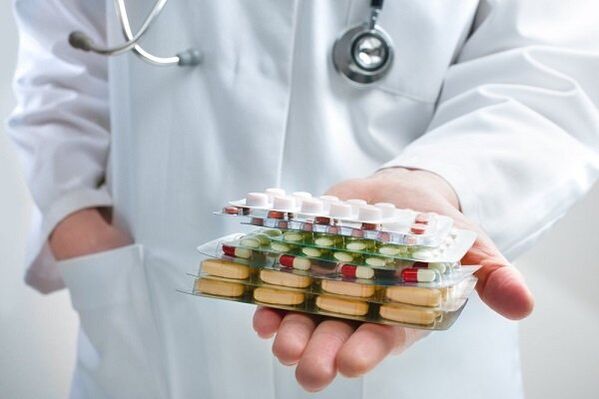Inflammation of the prostate is a common condition in men of all ages; this pathology is particularly commonly diagnosed in patients over 50 years of age.The disease greatly impairs quality of life, causing problems with urination, fertility and sexual function, and can also cause pain.

Diseases must be treated promptly and comprehensively.To do this, patients need to undergo medication, physical therapy, and a healthy lifestyle.Antibiotics are one of the mainstays of treatment for bacterial prostatitis, but choosing the right drug and dose are crucial for treatment to be effective.
Indications for use of antimicrobial compounds
Before you consider what antibiotics to take to treat prostatitis, you need to understand why it occurs.Contrary to the opinion of many patients, inflammation of the prostate occurs not only due to infection, but also to degenerative diseases of the organ.In the latter case, noninfectious prostatitis is detected.
To diagnose this disease, tank culture or PRC analysis is required, with the help of which doctors will detect the pathogen.If no bacteria are found, there is no need to take antibiotics.In this case, symptomatic treatment, diet, physical therapy and appropriate sexual activity are required.

If white blood cells are found in the prostate secretions and the pathogen is also identified, bacterial or tuberculous prostatitis is diagnosed.Both types of disease require specific treatment with antibiotics.
Often, PRC analysis is sufficient and results are available the next day.After identifying the bacteria, your doctor will prescribe appropriate antibiotics to treat prostatitis.If treatment is ineffective, tank culture of prostatic fluid must be performed to determine susceptibility to antimicrobial agents.
antibiotic group
Only a doctor can accurately answer which antibiotics should be taken for prostatitis.Because the bacteria must be detected first.If you self-medicate, there is a good chance that you will not be able to guess the group and turn the disease into a chronic form, which will significantly complicate the treatment process.
You also need to understand that the cause may be a fungal infection, rather than a bacterial infection.Antibiotics won't help in this case; you'll need to take medications with antifungal effects.

The following groups of drugs are used to treat acute and chronic conditions:
- Tetracyclines.If bacteria are detected, it is specified: Ureaplasma, Mycoplasma, Enterobacter, Chlamydia, Klebsiella, Enterococcus, Pseudomonas, Serratia, Escherichia coli.
- Fluoroquinolones.Suitable for the following bacteria: Ureaplasma, Mycoplasma, Neisseria gonorrhoeae, Chlamydia, Proteus, Klebsiella, Escherichia coli and Koch.
- penicillin.If detected, indicate: Neisseria gonorrhoeae, Enterobacter, Enterococcus, Klebsiella, Proteus, Serratia, Escherichia coli.
- Cephalosporins.Targets the following bacteria: Enterobacteriaceae, Enterococci, Klebsiella, Proteus, Escherichia coli.
- Macrolides.Indicated if: Neisseria gonorrhoeae, Chlamydia, Ureaplasma urealyticum, Mycoplasma are detected.
- Aminoglycosides.Targets the following bacteria: Klebsiella spp., Enterobacteriaceae, Pseudomonas spp.
- Hydroxyquinoline.Effective against the following bacteria: Ureaplasma, Mycoplasma, Trichomonas, Klebsiella, Escherichia coli, etc.
Most commonly, penicillins and cephalosporins are prescribed.Macrolides are rarely used because they are not particularly effective against prostatitis.Tetracyclines have side effects and are rarely used when other medications cannot be taken.
Aminoglycosides are effective in acute prostatitis.They penetrate the prostate and accumulate there, eliminating the infection.For the treatment of chronic diseases, such antibiotics are usually not prescribed, since it is impossible to achieve the required concentration of the substance in the glands.
For bacterial chronic prostatitis, doctors most often choose a group of fluoroquinolones.For inflammation of the prostate, they are most effective.
It is important to note, however, that fluoroquinolones have serious side effects and should not be taken until TB has been diagnosed.Such drugs for the treatment of prostate tuberculosis must be taken in conjunction with other antibiotics, otherwise the treatment will be ineffective and will only waste the patient's time.
List of antibiotics for treating prostatitis
The best antibiotics to treat prostatitis are those chosen by an experienced doctor based on examination results.There is no magic bullet that cures all illnesses; all medications are effective in some circumstances.It is important to accurately select from the identified pathogens the substance suitable for the treatment of a specific type of prostatitis.

The pharmaceutical market offers a variety of different types of medicines:
- penicillin;
- Cephalosporins;
- Aminoglycosides.
Tetracyclines are rarely prescribed.Macrolides are mainly used against mycoplasma and chlamydia.
One of the most effective drugs for the treatment of prostatitis are drugs belonging to the hydroxyquinoline class.This product helps eliminate most microorganisms that cause inflammation of the prostate and urinary tract, and the drug also has antifungal properties.
The dosage for men is individually prescribed, depending on the pathological cause, the characteristics of the particular drug taken and its release form.
For example, one antibiotic is prescribed to be taken 3 tablets daily, in the morning, lunch and evening.Another possibility is to give 1 ampoule intramuscularly at the same time each day.Treatment is carried out as a course; even if improvement occurs, the medication cannot be stopped early.
in conclusion
Every patient should remember that antibiotics are very serious drugs and their uncontrolled use can lead to complications.Therefore, if a man develops symptoms of prostatitis, he needs to consult a urandrologist as soon as possible and undergo examination.Antibiotic treatment can only be prescribed on the basis of an accurate diagnosis.























